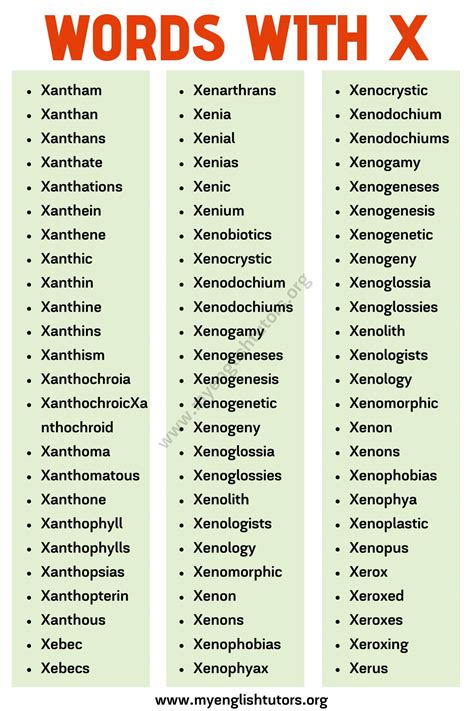The letter X is often considered a mysterious and exotic letter in the English language, and adjectives starting with this letter are no exception. These words can add a unique touch to your language, making it more fascinating and engaging. In this article, we'll delve into the world of X-traordinary adjectives starting with the letter X, exploring their meanings, usage, and examples.
Unraveling the Mystique of X-Traordinary Adjectives
The letter X is the 24th letter of the modern English alphabet and is often associated with the unknown, the unusual, and the extraordinary. Adjectives starting with the letter X are no exception, as they often convey a sense of mystery, intrigue, and excitement. Whether you're a writer, a poet, or simply a language enthusiast, X-traordinary adjectives can add a touch of magic to your words.

Exploring X-Traordinary Adjectives
Let's embark on a journey to explore some of the most fascinating X-traordinary adjectives, their meanings, and usage.
- Xanthic (adjective): having a yellow or yellowish color. Example: "The xanthic sunset was a breathtaking sight to behold."
- Xenial (adjective): friendly and hospitable to guests or strangers. Example: "The xenial atmosphere of the hotel made us feel welcome and at ease."
- Xerographic (adjective): relating to or produced by a xerographic process, especially a photocopier. Example: "The xerographic quality of the copies was exceptional."
- Xanthous (adjective): having a yellowish or blond color. Example: "The xanthous sand was soft and inviting on the beach."
- Xeric (adjective): relating to or characterized by a dry or drought-like condition. Example: "The xeric landscape was harsh and unforgiving."
Tips for Using X-Traordinary Adjectives
When using X-traordinary adjectives, remember the following tips:
- Use them sparingly: X-traordinary adjectives can be powerful tools in your language arsenal, but use them sparingly to avoid overwhelming your readers or listeners.
- Choose the right context: Select adjectives that fit the context and tone of your writing or conversation.
- Be mindful of pronunciation: Pay attention to the pronunciation of X-traordinary adjectives, as they can be unfamiliar to some readers or listeners.

X-Traordinary Adjectives in Literature and Poetry
X-traordinary adjectives have been used by writers and poets throughout history to add depth, nuance, and emotion to their works. Here are a few examples:
- James Joyce's "Ulysses": Joyce uses the adjective "xanthous" to describe the yellowish color of the sand on the beach in the novel.
- T.S. Eliot's "The Waste Land": Eliot employs the adjective "xeric" to describe the dry and desolate landscape in the poem.
Conclusion: Embracing the X-Traordinary
X-traordinary adjectives starting with the letter X can add a unique touch to your language, making it more fascinating and engaging. By exploring the meanings, usage, and examples of these adjectives, you can unlock the secrets of the mysterious and exotic letter X. Whether you're a writer, a poet, or simply a language enthusiast, embracing X-traordinary adjectives can take your language to new heights.






FAQ
What are X-traordinary adjectives?
+X-traordinary adjectives are adjectives that start with the letter X and are often used to describe something that is unusual, mysterious, or extraordinary.
How can I use X-traordinary adjectives in my writing?
+Use X-traordinary adjectives sparingly and choose the right context to add depth, nuance, and emotion to your writing.
Can I use X-traordinary adjectives in everyday conversation?
+Yes, you can use X-traordinary adjectives in everyday conversation to add interest and variety to your language.
